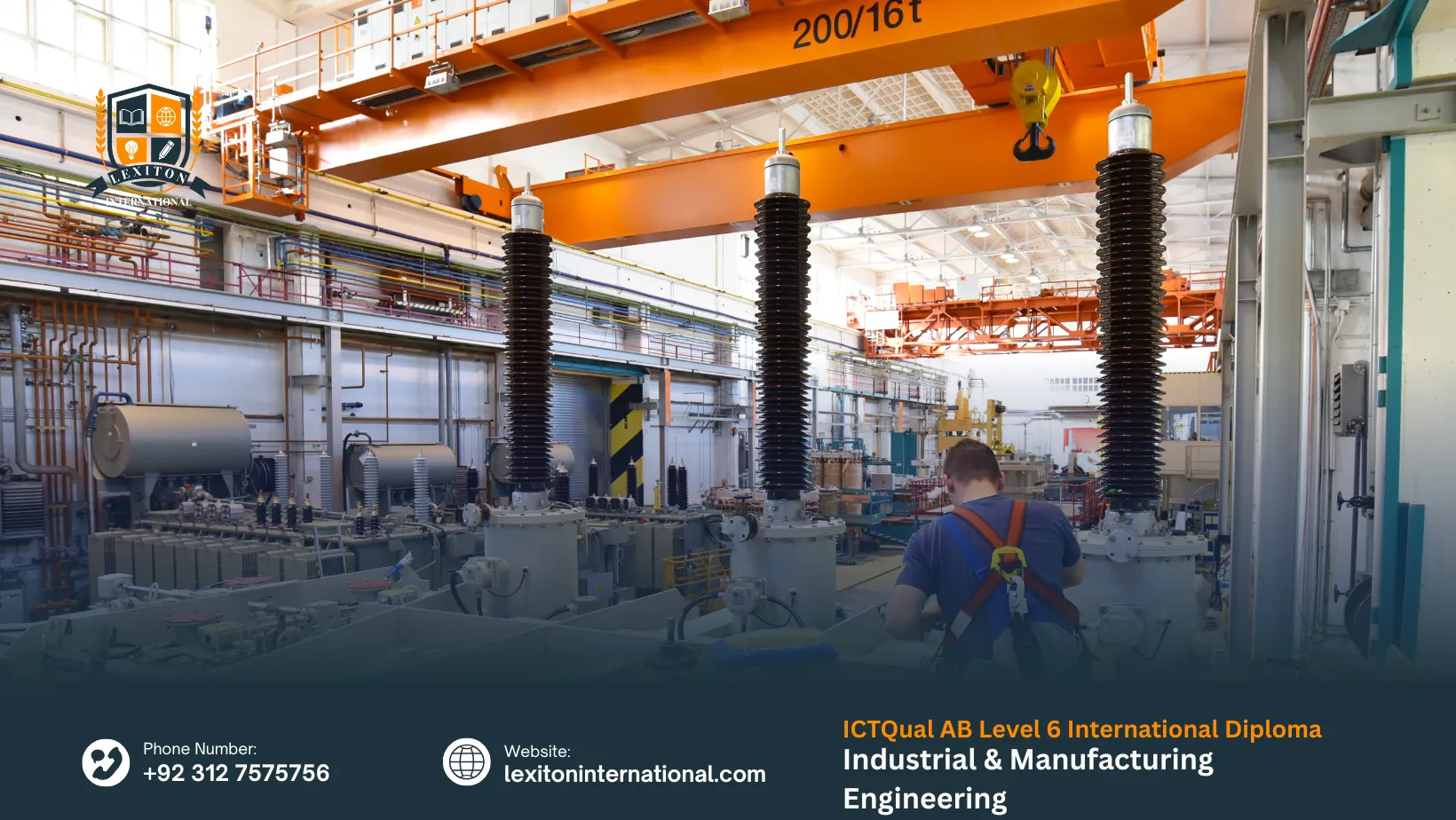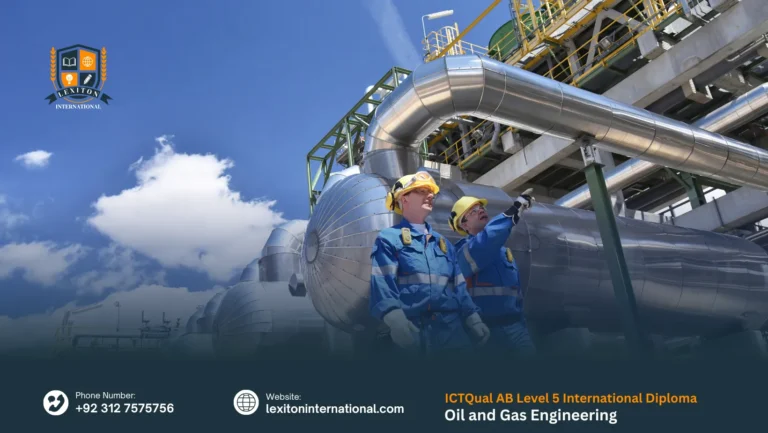The ICTQual AB Level 6 International Diploma in Industrial & Manufacturing Engineering is a globally recognized qualification designed to prepare learners for leadership roles in one of the most dynamic and high-demand sectors worldwide. This advanced diploma offers a rigorous curriculum that blends theoretical knowledge with practical application, equipping students with the skills needed to optimize production systems, manage industrial processes, and implement sustainable manufacturing practices. Whether you’re entering the field or seeking to accelerate your career, this program provides a strategic pathway to becoming a highly skilled industrial engineer.
Throughout the three-year, 360-credit program, learners explore a wide range of core topics including materials science, industrial automation, quality management, lean manufacturing, and production planning. The course emphasizes hands-on learning through real-world case studies, simulations, and project-based assessments. Students also gain exposure to global industry standards and emerging technologies, enabling them to design and implement engineering solutions that enhance productivity, reduce waste, and ensure compliance with international benchmarks.
Graduates of this diploma are well-positioned to pursue senior roles in manufacturing operations, process engineering, supply chain management, and industrial design. The qualification serves as a strong foundation for further academic progression into bachelor’s or master’s degrees in engineering and related disciplines. With its focus on innovation, efficiency, and strategic thinking, the ICTQual AB Level 6 Diploma empowers professionals to lead transformation in modern industrial environments and contribute meaningfully to global manufacturing excellence.
The ICTQual AB Level 6 International Diploma in Industrial & Manufacturing Engineering is designed for learners who wish to pursue advanced knowledge and professional competence in industrial systems, manufacturing technologies, and engineering management. To ensure participants gain the maximum benefit from this three-year, 360-credit programme, certain academic, professional, and language requirements are recommended.
- Age Requirement: Learners should ideally be 18 years or older, as the course covers advanced engineering concepts, manufacturing systems, and strategic industrial planning.
- Educational Background: Applicants should have a Level 5 qualification or equivalent in mechanical engineering, industrial technology, manufacturing, or related disciplines. Candidates with a bachelor’s degree or equivalent in engineering, production management, or industrial design are also eligible.
- Work Experience: Relevant industry experience in manufacturing operations, process engineering, or production planning is advantageous but not mandatory. Practical exposure to factory environments, automation systems, or quality control processes can enhance understanding of course concepts.
- English Language Proficiency: Learners should have a good command of spoken and written English to comprehend technical materials, complete assessments, and communicate effectively in professional and industrial settings.
- Professional Interest in Industrial & Manufacturing Engineering: Participants should have a strong interest in pursuing a career in manufacturing, production optimization, industrial automation, or engineering leadership.
- Commitment to Long-Term Study: As this is a three-year programme, candidates should be prepared for a structured learning schedule that combines theoretical knowledge with hands-on application, project work, and continuous assessment.
This diploma is ideal for motivated individuals seeking to become future leaders in industrial and manufacturing engineering, with the skills to drive innovation, efficiency, and global competitiveness.
Mandatory Units
This qualification, the ICTQual ABLevel 6 International Diploma in Industrial & Manufacturing Engineering 360 Credits – Three Years, consists of 36 mandatory units.
Year 1 – Foundation in Industrial & Manufacturing Engineering
Year 2 – Intermediate Studies in Industrial & Manufacturing Engineering
Year 3 – Advanced Studies in Industrial & Manufacturing Engineering
Learning Outcomes for the ICTQual AB Level 6 International Diploma in Industrial & Manufacturing Engineering:
Year 1 – Foundation in Industrial & Manufacturing Engineering
Principles of Industrial and Manufacturing Engineering
- Understand the scope, principles, and applications of Industrial & Manufacturing Engineering.
- Explain the role of engineers in improving productivity and efficiency.
- Identify key functions within industrial and manufacturing systems.
Engineering Mathematics
- Apply algebra, calculus, statistics, and trigonometry to solve engineering problems.
- Use mathematical models to analyse industrial processes.
- Develop logical and numerical reasoning skills for technical problem-solving.
Fundamentals of Mechanical and Electrical Engineering
- Explain the principles of mechanics, motion, energy, and electrical circuits.
- Apply basic laws of thermodynamics and electricity to engineering systems.
- Use mechanical and electrical knowledge to support industrial processes.
Materials Science and Engineering
- Identify classes of engineering materials and their mechanical properties.
- Understand the relationship between material structure and performance.
- Select suitable materials for different manufacturing applications.
Engineering Drawing and CAD
- Interpret technical and engineering drawings to global standards.
- Create 2D and 3D models using CAD software.
- Apply principles of tolerancing, dimensioning, and design communication.
Introduction to Manufacturing Processes
- Understand manufacturing methods such as machining, casting, welding, and forming.
- Compare conventional and modern manufacturing techniques.
- Evaluate process selection based on cost, quality, and efficiency.
Basics of Automation and Control Systems
- Explain open-loop and closed-loop control systems.
- Identify basic sensors, actuators, and controllers.
- Apply control system principles to simple industrial processes.
Production Planning and Operations Management
- Understand the fundamentals of production planning and scheduling.
- Apply techniques for capacity planning, inventory management, and process flow.
- Analyse the role of operations management in achieving efficiency.
Quality Fundamentals and Inspection Techniques
- Explain the principles of quality management and assurance.
- Apply inspection methods and measurement techniques in manufacturing.
- Identify defects and recommend corrective actions.
Health, Safety, and Environmental Practices in Engineering
- Understand workplace safety regulations and engineering risk assessment.
- Apply hazard identification and mitigation measures.
- Demonstrate awareness of environmental sustainability in industrial contexts.
Communication and Technical Report Writing
- Develop professional written and verbal communication skills.
- Prepare structured technical reports and presentations.
- Apply correct referencing and technical documentation standards.
Introduction to Project Management in Engineering
- Understand the basics of project management in industrial contexts.
- Apply simple planning tools such as Gantt charts and work breakdown structures.
- Identify risks, budgets, and resource requirements in small-scale projects.
Year 2 – Intermediate Studies in Industrial & Manufacturing Engineering
Manufacturing Systems and Technology
- Understand integrated manufacturing systems and their functions.
- Evaluate the role of automation in system efficiency.
- Analyse case studies of modern manufacturing technologies.
Advanced Production Planning and Scheduling
- Apply advanced scheduling methods to optimise workflows.
- Use planning tools for forecasting and resource allocation.
- Analyse bottlenecks and recommend improvements.
Lean Manufacturing and Continuous Improvement
- Understand lean principles such as waste reduction and value stream mapping.
- Apply tools like Kaizen, 5S, and Six Sigma basics.
- Evaluate the impact of lean practices on productivity.
Industrial Automation and PLC Programming
- Explain the role of automation in industrial applications.
- Develop and test PLC programs for automated processes.
- Troubleshoot basic PLC-controlled systems.
Supply Chain and Logistics Management
- Understand supply chain structures and global logistics systems.
- Apply techniques for demand forecasting and distribution management.
- Analyse strategies for supply chain optimisation.
Mechanical Design and Manufacturing Processes
- Apply mechanical design principles to industrial components.
- Understand advanced processes such as casting, forging, and additive manufacturing.
- Evaluate designs for manufacturability and efficiency.
Industrial Maintenance and Reliability Engineering
- Apply preventive and predictive maintenance techniques.
- Analyse reliability models and equipment performance.
- Implement condition-based monitoring systems.
Computer-Aided Manufacturing (CAM)
- Use CAM software for part programming and production planning.
- Apply CNC programming for manufacturing applications.
- Integrate CAD and CAM systems to streamline design-to-production workflows.
Data Acquisition and Process Monitoring
- Explain the principles of data acquisition systems.
- Apply signal conditioning, sampling, and filtering techniques.
- Use software tools for process monitoring and analysis.
Sustainable Manufacturing and Green Engineering
- Understand the principles of eco-friendly manufacturing.
- Evaluate renewable resources and energy-efficient processes.
- Recommend sustainable strategies for industrial operations.
Applied Research Methods in Engineering
- Develop structured research proposals in engineering.
- Apply qualitative and quantitative methods to technical studies.
- Interpret data and present evidence-based findings.
Human Factors and Ergonomics in Manufacturing
- Understand the role of ergonomics in workplace design.
- Apply human factors to improve productivity and safety.
- Evaluate case studies of ergonomics in industrial settings.
Year 3 – Advanced Studies in Industrial & Manufacturing Engineering
Smart Manufacturing and Industry 4.0
- Understand digital manufacturing and cyber-physical systems.
- Apply IoT, AI, and big data in smart factory environments.
- Evaluate the challenges of transitioning to Industry 4.0.
Advanced Manufacturing Technologies (Additive, CNC, etc.)
- Analyse additive manufacturing techniques (3D printing).
- Apply CNC and advanced machining for precision engineering.
- Evaluate innovations in advanced materials processing.
Robotics and Autonomous Systems in Manufacturing
- Understand the role of robotics in industrial automation.
- Apply path planning and robotic control strategies.
- Evaluate autonomous systems in flexible manufacturing.
Advanced Quality Management and Six Sigma
- Apply advanced statistical quality control techniques.
- Implement Six Sigma tools for defect reduction.
- Evaluate continuous improvement initiatives.
Cyber-Physical Systems and IoT in Manufacturing
- Understand the integration of physical processes with digital networks.
- Apply IoT protocols for industrial monitoring and control.
- Design small-scale cyber-physical systems for engineering applications.
Supply Chain Optimisation and Global Operations
- Apply advanced supply chain modelling and optimisation tools.
- Analyse risks in global supply networks.
- Recommend strategies for efficiency and resilience.
Advanced Process Engineering and Simulation
- Use simulation tools for analysing industrial processes.
- Model material and energy flows in production systems.
- Evaluate process improvements using digital simulation.
Innovation and Product Development in Engineering
- Understand the stages of product design and innovation.
- Apply tools for prototyping and testing.
- Evaluate the commercialisation of engineering products.
Professional Ethics and Sustainability in Manufacturing
- Demonstrate understanding of ethical principles in Industrial & Manufacturing Engineering practice.
- Apply sustainability frameworks in manufacturing projects.
- Evaluate the social and environmental impact of industrial operations.
Technology Entrepreneurship and Business Development
- Understand principles of entrepreneurship and innovation management.
- Develop business models for engineering-based ventures.
- Apply strategies for technology commercialisation.
Infrastructure and Facility Planning for Manufacturing Systems
- Understand facility layout design and optimisation.
- Apply planning principles for efficient material and workforce flow.
- Evaluate infrastructure requirements for modern industries.
Final Year Major Project (Capstone Project)
- Undertake an independent engineering project.
- Demonstrate integration of multidisciplinary knowledge.
- Present findings through a professional technical report and oral defence.
The ICTQual AB Level 6 International Diploma in Industrial & Manufacturing Engineering is designed for ambitious professionals and students who are ready to take on advanced roles in engineering, production, and industrial operations. This program is ideal for individuals who are passionate about innovation, process optimization, and strategic leadership in manufacturing environments.
Engineering Graduates
- Holders of diplomas or bachelor’s degrees in Mechanical Engineering, industrial, or manufacturing engineering
- Interested in deepening their technical and managerial knowledge
- Seeking to specialize in production systems and industrial automation
- Looking to align their qualifications with international engineering standards
- Preparing for leadership roles in engineering departments
- Motivated to pursue postgraduate studies in engineering or technology
Manufacturing Professionals
- Currently working in production, operations, or process engineering roles
- Responsible for managing factory workflows or production lines
- Interested in improving efficiency through lean and Six Sigma methodologies
- Seeking to enhance their understanding of quality control and industrial safety
- Looking to transition into supervisory or strategic planning roles
- Committed to continuous improvement and innovation in manufacturing
Quality Assurance and Compliance Officers
- Involved in maintaining ISO standards and regulatory compliance
- Responsible for inspection, testing, and documentation in manufacturing settings
- Interested in integrating quality systems with production processes
- Seeking to lead audits and implement corrective actions
- Looking to expand their role into engineering management
- Motivated to contribute to sustainable and ethical manufacturing practices
Technical Managers and Supervisors
- Leading teams in industrial or manufacturing environments
- Overseeing production schedules, resource allocation, and performance metrics
- Interested in strategic decision-making and operational leadership
- Seeking to enhance their technical foundation for better team coordination
- Preparing for senior management roles in engineering firms
- Looking to implement smart manufacturing and digital transformation initiatives
Aspiring International Engineers
- Planning to work on global engineering projects or multinational assignments
- Seeking internationally recognized qualifications for career mobility
- Interested in understanding global manufacturing standards and practices
- Preparing for roles in export-oriented industries or global supply chains
- Looking to build a competitive edge in international job markets
- Motivated to contribute to cross-border industrial innovation
Whether you’re an experienced professional or a recent graduate, this diploma offers the knowledge, recognition, and practical tools needed to thrive in the fast-evolving world of industrial and manufacturing engineering. If you’re ready to lead change, drive efficiency, and shape the future of production, this program is your gateway to success.
Completing the ICTQual AB Level 6 International Diploma in Industrial & Manufacturing Engineering opens up a world of opportunities for academic advancement, professional growth, and global career mobility. This qualification serves as a launchpad for learners who aspire to lead innovation, drive operational excellence, and shape the future of industrial engineering across diverse sectors.
Academic Advancement
Graduates can pursue higher education to deepen their expertise:
- Apply for postgraduate diplomas in Lean Manufacturing, Automation, or Supply Chain Optimization
- Participate in research programs focused on smart manufacturing and sustainability
- Qualify for doctoral studies in engineering or technology innovation
- Attend international academic conferences and publish technical papers
- Gain access to university pathways for global engineering credentials
Professional Certifications
Learners can enhance their credentials with specialized certifications:
- Six Sigma Black Belt or Lean Manufacturing Certification
- ISO 9001 Lead Auditor for quality system management
- Certified Production and Inventory Management (CPIM) by APICS
- Automation and robotics certifications (PLC, SCADA, IoT integration)
- Health, Safety & Environment (HSE) certifications for industrial compliance
- Project Management Professional (PMP) for leadership in engineering projects
Career Growth Opportunities
This diploma prepares learners for senior roles in industrial sectors:
- Industrial Engineer or Manufacturing Systems Analyst
- Operations Manager or Production Planning Lead
- Quality Assurance Manager or Compliance Officer
- Supply Chain Strategist or Process Improvement Consultant
- Engineering Project Manager in multinational firms
- Technical Director in manufacturing or automation companies
Global Employment Prospects
Graduates gain access to international job markets and mobility:
- Eligible for roles in Europe, the Middle East, Southeast Asia, and North America
- Opportunities in automotive, aerospace, electronics, and heavy manufacturing industries
- Preferred qualification for multinational corporations and export-driven firms
- Enhanced profile for visa sponsorship and global recruitment programs
- Ability to work on cross-border industrial projects and global supply chains
- Recognition by international engineering bodies and employers
Industry Networking and Professional Recognition
Learners can build strong professional networks and gain industry visibility:
- Membership in engineering societies like ASME, IEEE, or IET
- Participation in industrial forums, expos, and innovation summits
- Collaboration with global manufacturing leaders and technology providers
- Access to mentorship programs and leadership development workshops
- Recognition as a certified industrial engineering professional
- Opportunities to contribute to industry standards and best practices
Whether you’re aiming to pursue advanced studies, earn global certifications, or step into leadership roles, the ICTQual AB Level 6 Diploma provides the foundation and flexibility to shape your future. It empowers learners to become change-makers in industrial and manufacturing engineering, driving innovation and excellence across the global landscape.
Curious About This Course?







